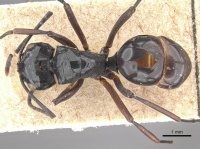Polyrhachis aruensis
| Polyrhachis aruensis | |
|---|---|

| |
| Scientific classification | |
| Kingdom: | Animalia |
| Phylum: | Arthropoda |
| Class: | Insecta |
| Order: | Hymenoptera |
| Family: | Formicidae |
| Subfamily: | Formicinae |
| Tribe: | Camponotini |
| Genus: | Polyrhachis |
| Subgenus: | Cyrtomyrma |
| Species: | P. aruensis |
| Binomial name | |
| Polyrhachis aruensis Viehmeyer, 1912 | |
Nothing is known about the biology of Polyrhachis aruensis.
Identification
Polyrhachis aruensis differs from Polyrhachis laevissima in having the mesosomal dorsum evenly convex in profile. The petiolar spines are very distinct, slender and acute and the subpetiolar process bluntly angular posteriorly. In contrast the profile of the mesosomal dorsum in Polyrhachis laevissima features a rather convex pronotum, with the mesonotum, propodeum and declivity descending posteriorly in a very weakly bowed line. The petiolar spines are rather short and blunt and the subpetiolar process is very weakly rounded posteriorly. (Kohout 2006)
Keys including this Species
Distribution
Endemic to the Indonesian's Aru Islands.
Distribution based on Regional Taxon Lists
Indo-Australian Region: New Guinea (type locality).
Distribution based on AntMaps
Distribution based on AntWeb specimens
Check data from AntWeb
Countries Occupied
| Number of countries occupied by this species based on AntWiki Regional Taxon Lists. In general, fewer countries occupied indicates a narrower range, while more countries indicates a more widespread species. |

|
Estimated Abundance
| Relative abundance based on number of AntMaps records per species (this species within the purple bar). Fewer records (to the left) indicates a less abundant/encountered species while more records (to the right) indicates more abundant/encountered species. |

|
Abundance
Rare. Specimens collected by W. Karawajew (Wokan and Wammar Is) are the only material of the species known, apart from the syntypes. (Kohout 2006)
Biology
Castes
Images from AntWeb
   
| |
| Syntype of Polyrhachis aruensis. Worker. Specimen code casent0912102. Photographer Z. Lieberman, uploaded by California Academy of Sciences. | Owned by NHMB, Basel, Switzerland. |
Nomenclature
The following information is derived from Barry Bolton's Online Catalogue of the Ants of the World.
- aruensis. Polyrhachis laevissima var. aruensis Viehmeyer, 1912: 9 (w.) NEW GUINEA. Combination in P. (Cyrtomyrma): Emery, 1925b: 207. Raised to species: Kohout, 2006b: 122.
Unless otherwise noted the text for the remainder of this section is reported from the publication that includes the original description.
Description
Worker
Unterscheidet sich von dem Typus vor allem durch die scharf zugespitzten und langgezogenen Zahne del' Schuppe (ahnlich wie bei rastellata). Beine mehr oder weniger pechbraun, abschussige Fluche des Epinotums ungefahr in der Hohe der Metathoraxstigmen jederseits mit einem sehr kleinen, stumpfen, buckelformigen Zahnrudiment , Thorakalseiten kraftiger und rauher skulpiert und darum matter. Die zahnformigen Vorderecken des Pronotums ebenso wie die Zahnrudimente des Epinotums in ihrer Grobe variabel.
L. 5-6 mm (in Anzahl in meiner Sammlung).
Type Material
Syntype workers Berlin Museum für Naturkunde der Humboldt-Universität - as reported by Kohout (2006).
Type Locality Information
INDONESIA, Aru Island, Wammar, Dobo, col. C. Ribbe 1883.
References
Kohout, R. J. 2006. Review of Polyrhachis (Cyrtomyrma) Forel (Hymenoptera: Formicidae: Formicinae) of Australia, Borneo, New Guinea and the Solomon Islands with descriptions of new species. Memoirs of the Queensland Museum. 52:87-146.
Viehmeyer, H. 1912. Ameisen aus Deutsch Neuguinea gesammelt von Dr. O. Schlaginhaufen. Nebst einem Verzeichnisse der papuanischen Arten. Abhandlungen und Berichte des Königl. Zoologischen und Anthropologisch-Ethnographischen Museums zu Dresden 14: 1-26.
References based on Global Ant Biodiversity Informatics
- Janda M., G. D. Alpert, M. L. Borowiec, E. P. Economo, P. Klimes, E. Sarnat, and S. O. Shattuck. 2011. Cheklist of ants described and recorded from New Guinea and associated islands. Available on http://www.newguineants.org/. Accessed on 24th Feb. 2011.
- Kohout R.J. 2006. Review of Polyrhachis (Cyrtomyrma) Forel of Australia, Borneo, New Guinea and the Solomon Islands with descriptions of new species. Memoirs of the Queensland Museum 52: 87-146.
- Viehmeyer H. 1912. Ameisen aus Deutsch Neuguinea gesammelt von Dr. O. Schlaginhaufen. Nebst einem Verzeichnisse der papuanischen Arten. Abhandlungen und Berichte des Königlichen Zoologischen und Anthropologische-Ethnographischen Museums zu Dresden 14: 1-26.

